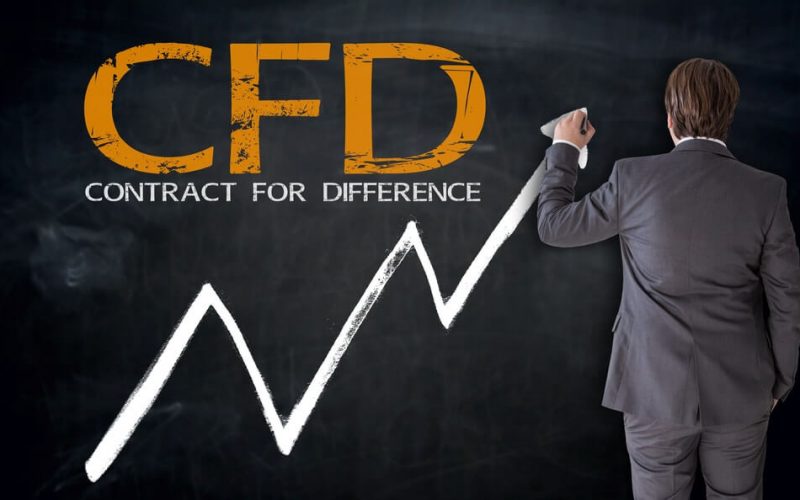With the opportunity to trade on falling markets, apply leverage, and access thousands of instruments, some of which trade 24 hours a day, investors are taking advantage of the variety of CFDs as part of their portfolio. If you wish to engage in trading CFD on investmentsglobal in the USA, this course will address all of your questions. Is it legal or illegal to invest in CFDs? How do you find the best US CFD trading brokerage and platform? Continue reading for answers to these issues, as well as a full examination of the rules governing CFD trading in the United States.
What Is Contract for Difference Trading (CFD Trading)?
Contracts for difference (CFDs) are agreements between buyers and sellers to pay the difference between the current value of a security and the price at the contract time. They are also derivatives, which means you do not own the underlying asset.
CFDs are particularly popular for two reasons:
- Markets – Traders can purchase CFDs on stocks and shares, forex, futures, options, commodities, and many other markets online.
- Leverage – Trading can be financed by putting down a small percentage of a trade, known as margin, and borrowing the rest from a brokerage firm. This increases potential profits but also potential losses.
Is CFD Trading Legal In The USA?
Unfortunately, trading CFDs is prohibited for US citizens. The Securities and Exchange Commission (SEC) and the Commodity Futures Trading Commission (CFTC) prohibit US residents and citizens from opening CFD trading accounts on domestic or foreign platforms.
CFDs are illegal in part because they are an over-the-counter (OTC) product that does not pass through regulated exchanges. Furthermore, American regulators are concerned about the possibility of large losses resulting from the use of leverage. Despite this, some US citizens seek access to CFDs through offshore firms. However, there are risks associated with this, one of which is locating an adequately regulated option. Most FCA-regulated firms, for example, do not enable US citizens to register an online CFD trading account.
Non-US citizens, on the other hand, can trade CFDs on US stocks and markets. The restrictions only apply to US citizens and residents.
Please keep in mind that the rest of this article is intended for traders based outside the United States who are legally permitted to trade CFDs in their respective jurisdictions.
Read Also: Trading For Beginners: Trading Guide & Strategies For Beginners
CFD Trading In The USA
Getting started with CFD trading in the United States is simple for non-American citizens:
- Find a brokerage – First and foremost, ensure that they are regulated. Then, ensure that any commissions or fees are reasonable. Check to see if their platform is dependable and fits your trading style.
- Create a new account – Many service providers offer multiple accounts. In general, the larger the initial deposit, the better the leverage options, customer support, and analysis tools available.
- Find a market opportunity – Identify an opportunity in your chosen market, such as the USD/JPY currency pair. Do you believe the price is about to rise or fall? Once you’ve made your decision, how much margin do you want to trade on?
- Take a position – Open the trade ticket on your platform and enter a position. Add a stop-loss order to limit losses when they reach a certain point, and a stop-limit order to limit profits when they reach a certain level.
- Monitor and exit – In accordance with your strategy, exit the position when your charts and tools indicate that it is appropriate. Try not to let your emotions influence your decision-making.
Choosing a CFD Trading Brokerage in the USA
There is no regulated online CFD trading platform based in the USA because they are illegal. International traders, on the other hand, have a wide range of providers to choose from. The first thing to look for is whether a potential company is regulated by a reputable body, such as the Financial Conduct Authority (FCA) or the European Securities and Markets Authority (ESMA) (ESMA).
Popular firms for American markets include IG and CMC Markets, both of which are regulated by the FCA. IG offers over 17,000 CFDs in interest rates, bonds, FX, cryptocurrencies, and other markets. CMC Markets offers over 9,500 CFDs with competitive spreads. Pepperstone is another of the largest companies, headquartered and regulated in Australia. Pepperstone offers three sophisticated platforms, and spreads can drop to zero pips during periods of low liquidity.
Personal preference will determine which CFD brokerage firms are best for US index funds and markets.
Best CFD Trading Platform
CFD trading platform is a good place to start because they are computer software that acts as a gateway to a trading service where one may buy and sell financial assets. Such a platform typically offers a variety of trading types, including CFDs, for transactions between traders either directly or through an intermediary/broker/agent, allowing traders to trade remotely from anywhere. CFD trading is always done in pairs and can involve stocks, currencies, commodities, shares, and so on (USD to EUR, Shell to Exxon). We chose the top five CFD trading platforms based on their usability, friendliness to newcomers, fair commissions, and other aspects.
#1. Plus500
Account minimum: $100 | Maximum leverage: 1:30 | Average CFD margin: N/A
Plus500 Ltd is a company that provides financial services. It is an experienced platform with headquarters in Israel and offices in the United Kingdom, Australia, and Cyprus. Plus500 is a well-known CFD trading platform that is not available in Canada or the USA (over 5M downloads from the Play Store). For debit/credit cards, the minimum deposit is $100, and for bank transfers, the minimum deposit is $500. CFDs for trading include stocks, forex, indices, commodities, and even cryptocurrencies. S&P 500, Euro/Pound, Euro/Dollar, gold, oil… you name it.
Features:
- Advanced risk management tools
- Price and real-time market alerts
- CFDs on cryptocurrency (availability subject to regulation) – Bitcoin, Litecoin, Ethereum
- There are no restrictions on the free demo account.
- Economic calendar with up-to-date information and real-time events
- Risk management settings – for example, limit to close at a certain profit/loss, trailing stop
- Online assistance is available 24 hours a day, 7 days
What makes Plus500 one of the most appealing CFD trading platforms is its zero charge (yes, nothing) for many actions, such as deposits, open/close trades, and live CFD prices. Users pay a spread to open a position (bid). Overnight trading, stop orders, and account inactivity may incur additional fees. Also, keep in mind that if you log in to your account on two different devices, one of them will be disconnected.
Pros
- Keeping customer costs in a real bank account
- Online sign-up is quick and easy with a simple workflow.
- Support in multiple languages is available 24 hours a day, seven days a week.
Cons
- There is no MT4 connection.
- After 3 months of inactivity, there is a $10 fee.
- Numerous customer complaints about scams
- Warning. 76.4 percent of retail CFD accounts lose money.
#2. eToro
Account minimum: $200 | Max.leverage: 1:30 | Average CFD margin: 30%
eToro Group Limited, which was founded in Cyprus in 2007, is the world’s leading CFD trading platform (with offices in England and Israel). eToro is positioned as an innovative web trading platform that distinguishes itself from other CFD trading platforms by offering social trading capabilities, also known as mirror trading or copy trading, which allow users to simply follow the actions of trusted brokers and make the same investments. This made it quite popular in 140 countries, with over 3 million accounts.
Key Features:
- Two-in-one social trading and investment platform
- CopyTrader is a feature that allows you to copy trades and deals.
- CopyPortfolios have two features: copy markets (asset groups that follow trading strategies) and copy top trader funds.
- Ability to view any member’s transactions for the entire period
- Set a stop loss – a minimum amount of money on account.
- Market hours are available 24 hours a day, 7 days
- eToro Economic Calendar – to view events that may have an impact on trades.
- Trading Academy – a page with webinars, courses, and a blog.
- You can withdraw as little as $30, but there is a $5 minimum withdrawal fee. There is also a $10 inactivity fee if you have not logged into your account for 12 months.
- eToro complies with multiple regulations and bodies, takes cybersecurity seriously, and is available to customers 24 hours a day, seven days a week. Also, keep in mind that every deal has a $5 withdrawal fee.
Pros
- Account opening in a flash
- Reasonable fees and commissions
- Multiple languages, user-friendly interface
Cons
- High non-trading commissions
- In comparison to other platforms, this platform has fewer trading assets.
- Inactivity fee
Warning: Your money is at stake. Virtual currencies are highly volatile, and additional fees may apply. When trading CFDs with this supplier, 67% of retail investor accounts lose money. You should assess whether you can afford to take the high risk of losing your money.
#3. Vantage FX
Account minimum: $200 | Maximum leverage: 1:500 | Average CFD margin: N/A
VantageFX is a regulated broker for Australia, the United Kingdom, and Islamic nations, and it provides traders all over the world with access to over 180 trading products, including Forex, Share CFDs, indices, and commodities, via the industry-leading MT4 and MT5 platforms. Vantage FX clients enjoy lightning-quick trade execution, razor-thin spreads, and a completely transparent trading environment.
It is quick and simple to open an account with Vantage FX, and you can start with as little as $200. As soon as your account is activated, you will be able to access a vast array of trading instruments and begin trading in any manner, including scalping, swing trading, position trading, and even automated trading.
Key Features:
- STP and RAW ECN accounts
- Volume-related bonuses, margin interest, and other trading tools
- Support for MetaTrader 4 and MetaTrader 5
- 300+ tradable assets, including 13 indices, 20 commodities, and 100 share CFDs
- Protection from negative balance
- For deposits of up to $500, the welcome bonus equity is 50%.
- News regarding 35,000+ tradable assets in premium accounts
- Analytical reports for over 80,000 indices are currently in use.
VantageFX does not charge any fees for deposits, withdrawals, or account maintenance. Clients can trade from a desktop computer as well as their mobile device, with 13 trading platforms to select from.
Pros
- Available 24 hours a day, 7 days a week
- Quick execution
- Mobile apps with several functions
Cons
- No API
- A large initial deposit
#4. Capital.com
Minimum account balance: $20 | Maximum leverage: 1:200 | Average CFD margin: N/A
Capital.com was launched in 2016 with the goal of creating a CFD trading platform that stood out from the crowd. As a result, a vast trading platform was created, utilizing AI (SmartFeed) and a variety of technical instruments. SmartFeed system closely monitors traders’ activities and behavior in order to spot trends, attractive bargains, and so on. Capital partners with RBS and Raiffeisen, two of the largest banks, to store client funds in addition to encrypting user data. Keep in mind that Capital.com is a company registered in England and Wales and regulated by the FCA (733714 licenses), whereas Capital Com SV Investments Ltd is regulated by CySEC under license number 319/17.
Capital.com offers free real-time quotes, over 75 technical indicators, dynamic charts, and rich sketching tools. The platform displays real-time price variations as well as historical data and scores a variety of parameters (most-traded and most-volatile assets, top risers and fallers, etc). Funds can be transferred or withdrawn through a variety of worldwide ways, including debit cards, credit cards, bank wire transfers, and foreign payment services like Webmoney, ApplePay, and UnionPay China (there are 18+ providers in all).
Key Features:
- 3000+ Markets: 142 currency pairs, 53 commodities, 34 indices, 2733 stocks, and 83 cryptocurrencies.
- There are no costs for deposits, withdrawals, real-time quotations, opening/closing deals, or anything else.
- Trading applications for the web and mobile
- 75+ technical indicators, as well as charts, price alerts, and so on.
Capital.com is definitely one of the premier CFD platforms today, with zero commission for a variety of trades. It also goes above and above in explaining and educating about the complexities of contract-for-difference trading. Leverage, long and short positions, benefiting from rising and declining markets, hedging, and other topics are covered.
Pros
- The minimum account balance is $20.
- Advanced artificial intelligence (AI) at work.
- The withdrawal policy is available 24 hours a day.
Cons
- Average CFD margins are unclear.
- A high leverage ratio could result in a significant loss.
Warning: When trading CFDs, 71.2 percent of retail investor accounts lose money.
#5. Interactive Brokers
Account minimum: $0 | Maximum leverage: 1:500 | Average CFD margin: 4%
IB Group, a global top-tier trading firm with over 40 years in the industry, now offers a strong trading software platform, TWS (Trader Workstation). It is a marketplace where investors may trade stocks, options, futures, bonds, and funds across 125 markets with a single account. Interactive Brokers is an internet trading platform headquartered in Connecticut, USA. The web portal (IBKR WebTrader), desktop app, mobile platform (IBKR Mobile for iOS and Android devices), IBot, and API are among the products available. To begin trading, there is a “zero” minimum deposit policy, yet inactivity may result in a fine.
Key Features:
- View/trade numerous assets and CFDs in a single window with a universal account.
- Reports, such as real-time trade notifications, margin information, cost analysis, and so on.
- Smart Routing technology is used to compute a CFD reference price (the exchange-quote price for a specific share)
- Quotes that are transparent — The IB charges an honest commission on spreads and price fluctuation, with no requotes.
- FX Trader – includes live quotes, indicators, volumes, pending trades, and so on.
- IBot is a personal assistant that provides quick information on stocks, account balances, and other topics.
- Portfolio Analyst is a reporting and management application that includes over 200 benchmarks.
- TWS software offline installer
TWS supports over 60 order types, ranging from simple to complicated CFD trading algorithms. Commissions are lower than those offered by other platforms – depending on the index, starting rates range from 0.005 percent to 0.01 percent. The platform also includes risk management and asset monitoring capabilities, as well as coherent real-time data for active traders to react swiftly.
Pros
- Trading software that is both powerful and all-purpose.
- Very useful for market and portfolio analysis.
- Low fees and clear commissions
Cons
- To begin with, TWS will be difficult and time-consuming.
- Accounts that are small or inactive may be charged a maintenance fee.
- CFD trading is subject to regional restrictions.
Conclusion
CFD trading is currently prohibited for traders based in the USA. While American citizens cannot invest, traders from a variety of other countries can buy and sell CFDs on US exchanges. Furthermore, with the appropriate approach, CFD trading in the USA might be profitable. But keep in mind that the vast majority will lose money. When looking for the greatest firms and platforms in the United States, take into account all of the factors listed above.
CFD Trading FAQ’s
Why is CFD illegal?
CFDs are illegal in the United States in part because they are an over-the-counter (OTC) product, which means they do not transit through authorized exchanges. Leverage also increases the likelihood of higher losses, which regulators are concerned about.
Is CFD trading safe?
Any financial investment has risk, and CFDs are no exception. CFD assets traded without leverage are subject to the same risks as those traded directly.
Can you get rich trading CFDs?
The short answer is that yes, it is possible to make money using CFD trading. The long and more practical answer is that to do well in the market, you must first polish your trading skills and have a lot of discipline, practice, and patience.
Related Articles
- Cryptocurrency Trading App: Best 10 Crypto Trading Apps Review
- Gross Pay: Definitions, Calculations and Examples (+Quick Tools)
- Financial Leverage: Simple Guide to help you get started, with Examples (+ quick tips)
- BEST CRYPTO EXCHANGE WITH LOWEST FEES: Top 11+ (Updated)
- Best Crypto Trading Platforms: Top 10 Reviews (+free trading tips)






